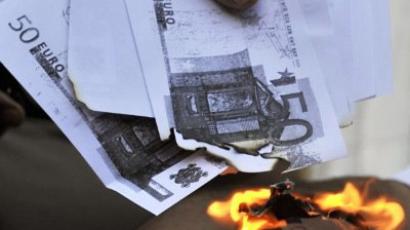Slovakian government cracks under pressure to bailout EU
A rift within Slovakia's government prevented one of the Eurozone’s poorest countries from approving an increase in the EU’s bailout fund on Tuesday.
The vote on the bailout was blocked by the neo-liberals of the Freedom and Solidarity Party, as well as the social democrats of the Socialist Smer Party.The leader of the Freedom and Solidarity Party, Richard Sulik, fiercely opposed the increase in the bailout funds, saying it was not fair to pay for Greek debt from Slovakia’s pocket.“The average pension in Slovakia is less than 400 euros,” Sulik declared last week. “The average pension in Greece is 1,400 euros – three, four times higher.”“It's impossible to explain to a Slovak pensioner that he or she has to contribute – in the form of higher VAT, for example – toward Greek pensions,” he said. “Or toward Italian MPs’ salaries, the highest in Europe.”Both Slovakian Prime Minister Iveta Radicova and her main political opponent now say they will work to get the bill approved swiftly. Still, it is not clear when another vote will be held.Slovakia is the last of the 17 members of the Eurozone to approve the proposed expansion of the European Financial Stability Facility, which has been designed to protect weaker economies in the Eurozone from the sovereign debt crisis. Had Slovakia approved the move, it would have contributed around 1 per cent of the 440-billion-euro bailout package. Financial advisor Patrick Young says Slovakia has done a good job of balancing its own budget in recent years, and the Slovakian people simply do not want to pay for Greece’s debt. “Ultimately this is a question of not just principle, but actually the rational economic well-being of the ordinary working people of Slovakia,” Young told RT. “They have endured incredible cuts during the course of the last three years in order to keep the Slovakian economy going.”Slovakians, as the lowest wage-earners in the Eurozone, are incredibly fiscally pragmatic, added Young. So they can hardly feel any solidarity with the Greek government, which lied about their figures just to get into the Eurozone, he concluded.














